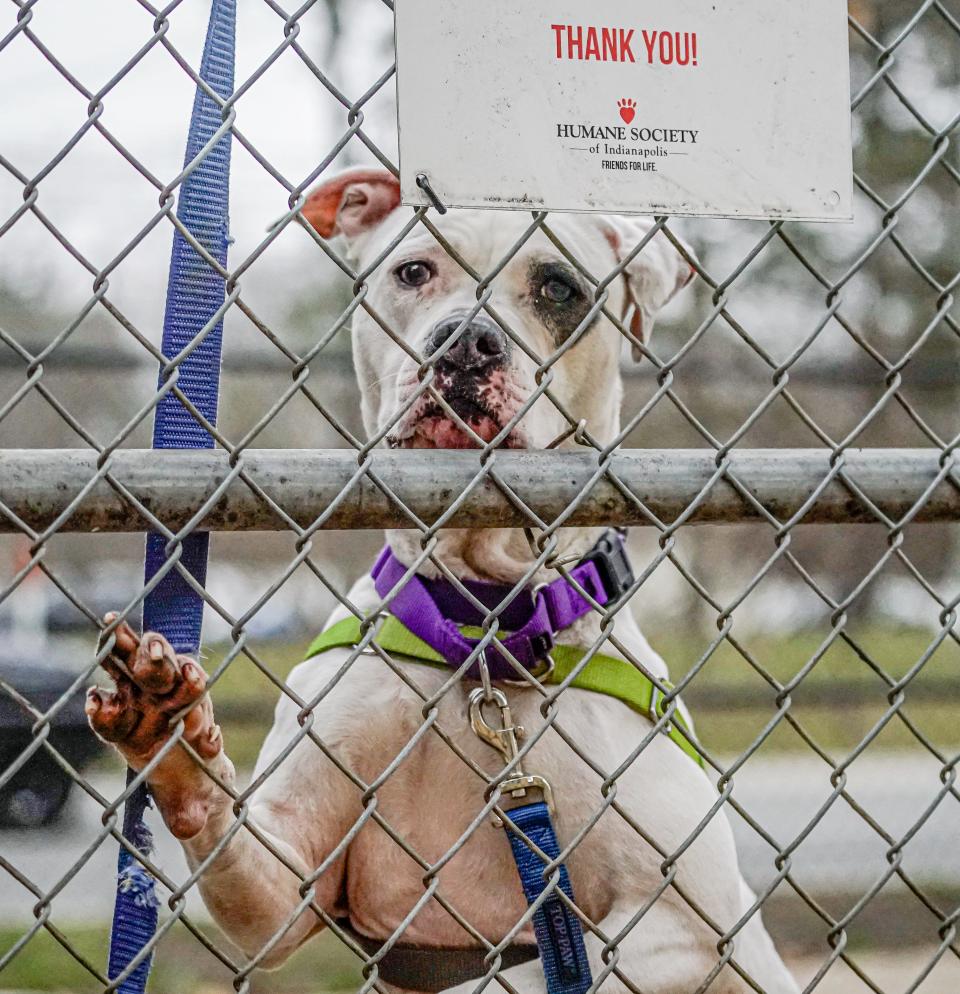Hot dogs (or cats) aren't cool. Vet offers tips on keeping your pets safe during heat wave
Summer heat waves can pose health risks to Hoosiers, but the high humidity and temperatures can also pose a risk to family pets.
To understand how to keep animals safe and comfortable, IndyStar spoke with Dr. Aimee Brooks, an emergency critical care specialist at Purdue University’s College of Veterinary Medicine, for advice.
Pets, just like humans, can experience heat exhaustion and heat stroke when exposed to high temperatures, and time is the biggest factor in both severity and seeking help, Dr. Brooks said.
Since cats are good about regulating themselves in the heat and generally more tolerate, Dr. Brooks said it’s uncommon to see them with heat-related illnesses. But dog owners need to be more vigilant.
What your pet should avoid during heat waves
Pets need to acclimate to heat, and during a heat wave is not the time to do it, Dr. Brooks said, as the process can takes weeks or months.
Dogs that are outside during times of high heat should have access to shade and all the water they want, and if they are not acclimated to the heat, they should not be outside for long periods of time.
“I would try to avoid vigorous exercise in the heat of the day,” Dr. Brooks said. “If you're going to take them for walks, mornings and evenings are better ― not only because of the environmental heat, but the pavement gets really hot, and they can actually get burns on their feet from blacktop.”

Some dog breeds with short faces (like French bulldogs) are really prone to heat stroke since they can’t pant and that’s how they cool off, Dr. Brooks said.
Animals that are obese, have heart disease or respirator issues are also more prone to heat-related illnesses, so owners should take more care.
No AC?: Here's where to stay cool or swim in Indianapolis amid heat wave
Symptoms in pets suffering heat-related illness
If a pet is outside in the heat for too long, there are ways to tell if they are suffering from heat-related illnesses.
Dogs will pant more heavily when they first start to overheat. The first signs of heat exhaustion to look out for are when dogs seek out shade and lay down to try and cool off. Some dogs might start drooling a lot, Dr. Brooks said.
If these symptoms continue, or the dog is unable to cool off, the illness can progress to heat stroke.
“That usually happens when their body gets above 105 degrees Fahrenheit or so,” Dr. Brooks said. “Then you might to see vomiting, diarrhea or collapse.”
The dog’s mental state can also be affected from heat stroke. These symptoms show up as a decreased level of consciousness and could lead to unresponsiveness.
A dog’s gums will initially get very red and, as they progress into shock, become a pale purple.
How to care for pets suffering from the heat
The longer a pet is exposed to the heat, the worse the outcome could be.
If a pet is exhibiting signs of heat exhaustion, Dr. Brooks said the best thing to do is cool them off with cool water from the sink or hose.
“One thing people do need to be aware of about the hose is that if the hose has been sitting out in the sun with water in it, the first water that comes out of the hose is really hot,” Dr. Brooks said. “I've actually seen animals with burns from the water.”
Once the dog is wet to the skin, bring them into a shady area or air-conditioned space. If an owner is able, check the dog’s temperature to make sure it’s not above 105. Dr. Brooks also points out that overcooling can also cause issues, so don’t cool them off so much that their temperature drops below 103.
If symptoms get beyond heavy panting (or don’t stop within 30 minutes to an hour) and into gastrointestinal issues, Dr. Brooks said it’s time to take them to a veterinarian.
It’s best to take the pet to the closest veterinarian so they can be cooled and rehydrated as soon as possible.
“Time matters when it comes to getting them cooled off and resuscitated,” Dr. Brooks said.
Nearly every vet is equipped to administer fluids and cool a dog off and can refer a pet to a more capable hospital if the symptoms are more severe.
Karl Schneider is an IndyStar environment reporter. You can reach him at [email protected]. Follow him on Twitter @karlstartswithk
IndyStar's environmental reporting project is made possible through the generous support of the nonprofit Nina Mason Pulliam Charitable Trust.
This article originally appeared on Indianapolis Star: Indiana heat wave affects pets, too. Here's how to keep them safe
Solve the daily Crossword

